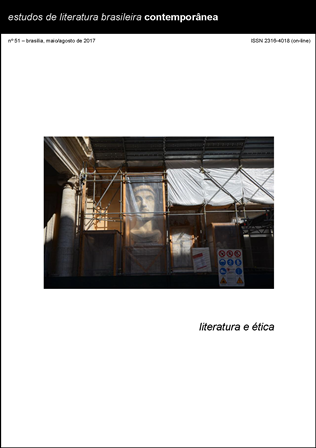Pacto com o diabo:
Divórcio, de Ricardo Lísias, como manual para compreender a autoficção
DOI:
https://doi.org/10.1590/2316-4018519Abstract
Propõe-se que Divórcio, de Ricardo Lísias, ao expor didaticamente todo o ferramental da chamada autoficção, funciona como manual para apreender o gênero e pensar sua especificidade: a ver, o jogo entre a indefinição do estatuto ficcional e a dimensão ética de uma recepção orientada pela performance autoral dentro e fora do texto. A partir daí, pode-se pensar o papel dessa incerteza estatutária e do jogo performático com o leitor na defesa, pelo romance, de uma autonomia absoluta do fazer literário.
References
ALBERCA, Manuel. El pacto ambiguo. De la novela autobiográfica a la autoficcion. Madrid: Biblioteca Nueva, 2007.
ANGOT, Christine. Les petits. Paris: Flammarion.
BARTHES, Roland (2004). O rumor da língua. Tradução de Mario Laranjeira. 2. ed. São Paulo: Martins Fontes, 2011.
BLANCKEMAN, Bruno. Les récits indécidables: Jean Echenoz, Hervé Guibert, Pascal Quignard. Lille: Presses Universitaires du Septentrion, 2000.
BURGELIN, Claude; GRELL, Isabelle. Autofiction(s). Actes du colloque de Cerisy-la-Salle. Lyon: PUL, 2010.
DOUBROVSKY, Serge. Fils. Paris: Galilée, 1977.
DURANTAYE, Leland de la. How to read Philip Roth, or the ethics of fiction and the aesthetics of fact. The Cambridge Quarterly, Oxford, v. 39, n. 4, dez. 2010. p. 303-330.
EAKIN, Paul John. The ethics of life writing. Ithaca; Londres: Cornell University Press, 2004.
FOREST, Philippe (Ed.). Je & moi. Paris: Gallimard, 2011. (La Nouvelle Revue Française, n. 598).
GALÃNDEZ-JORGE, Verónica. Fogos de artifício: Flaubert e a escritura. Cotia: Ateliê, 2009.
GALLE, Helmut. O gênero autobiográfico: possibilidade(s), particularidades e interfaces. Tese (Livre Docência) ”“ Universidade de São Paulo, São Paulo, 2011.
GASPARINI, Philippe. Autofiction: une aventure du langage. Paris: Seuil, 2008.
GASPARINI, Philippe. Poétiques du Je. Du roman autobiographique à l'autofiction. Lyon: PUL, 2016.
GENETTE, Gerard. Seuils. Paris: Seuil, 1987. (Col. Poétique).
GENETTE, Gerard. Fiction et diction. Paris: Seuil, 1991.
KLINGER, Diana. Escritas de si, escritas do outro: o retorno do autor e a virada etnográfica. Rio de Janeiro: 7 Letras, 2007.
LEJEUNE, Philippe. Le pacte autobiographique. Paris: Seuil, 1975.
LEJEUNE, Philippe. Signes de vie: le pacte autobiographique 2. Paris: Seuil, 2005.
LÃSIAS, Ricardo. Divórcio. Rio de Janeiro: Alfaguara, 2013a.
LÃSIAS, Ricardo. Em “Divórcio”, o drama pessoal é ponto de partida para a ficção. Entrevista a Luciano Trigo. G1, Blog Máquina de Escrever, Rio de Janeiro, 8 set. 2013b.
LÃSIAS, Ricardo. O que os fortes queriam? Uma análise de O que é isso, companheiro? e Os carbonários. Estudos de Literatura Brasileira Contemporânea, Brasília, n. 48, 2016. p. 229-246.
MONTEIRO, Pedro Meira. Como falar a verdade? A ética da ficção em Divórcio, de Ricardo Lísias. Celeuma, 2013.
RICOUER, Paul. O si mesmo como outro. São Paulo: WMF Martins Fontes, 1990/2010.
SCHMITT, Arnaud (). Je réel / Je fictif: au-delà d'une confusion postmoderne. Toulouse: Presses universitaires du Mirail. (Collection Cribles), 2010.
SCHWARZ, Daniel. A humanistic ethics of reading. In: DAVIS, Todd F.; WOMACK, Kenneth (Dir.). Mapping the ethical turn. A reader in ethics, culture, and literary theory. Charlottesville: University Press of Virginia, 2001.
Downloads
Published
Issue
Section
License
Authors who publish in this journal agree to the following terms:
a) The authors maintain the copyright and grant the journal the right of first publication, the work being simultaneously licensed under the Creative Commons Attribution License-Non Commercial 4.0 which allows the sharing of the work with acknowledgment of the authorship of the work and publication this journal.
b) Authors are authorized to enter into additional contracts separately, for non-exclusive distribution of the version of the work published in this journal (eg publish in institutional repository or as a book chapter), with authorship recognition and publication in this journal.
c) Authors are allowed and encouraged to publish and distribute their work online (eg in institutional repositories or on their personal page) after the editorial process, as this can generate productive changes, as well as increase the impact and citation of published work (See The Effect of Free Access).
d) The authors of the approved works authorize the magazine to, after publication, transfer its content for reproduction in content crawlers, virtual libraries and the like.
e) The authors assume that the texts submitted to the publication are of their original creation, being fully responsible for their content in the event of possible opposition by third parties.


